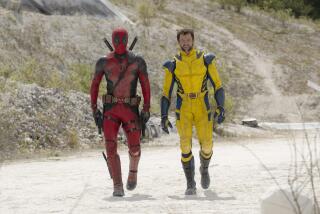‘Foster Father’ of X-Men Creates New Family : Comics: Writer Chris Claremont hopes to recapture the success he found with the mighty, atomic mutants.
- Share via
Ask a typical comics fan how he or she feels about Marvel’s Uncanny X-Men, and nine times out of 10 what you’ll hear is unstinting praise.
And no wonder. The X-Men--atomic mutants who are spurned and discriminated against even as they apply their “X-Factor” powers to save mankind--are among the most popular characters in comicdom. Yet what attracts readers to the mighty mutants isn’t their amazing power, but the fact that there are complex and compelling characters beneath those bulging muscles and skintight super-suits.
In other words, X-fans haven’t kept turning those pages merely to see if good really did triumph over evil. They read on because they’re curious to see how the characters develop, whether their relationships pan out, and--most importantly--what will happen to them next.
Or, as ex-X-Men writer Chris Claremont puts it, they read not because the premise is so mind-bendingly fantastic, but because there are “characters that you could relate to right off, that you could root for, that you could believe in.”
“With those characters as the anchor, the fantastic stuff that got thrown at you moment after moment was made easier to take,” he says over the phone from his Brooklyn studio. “You weren’t just being cast off into the unknown with nothing to hold onto.
“One of the classic moments from X-Men early on had Cyclops, the perpetual Heathcliff, watching his girlfriend Jean Grey explain to her parents that she’s become cosmic and basically just came back from saving the universe. And he’s kind of going, ‘Oh, how can I deal with my girlfriend now that she can save the universe?’ And ‘Poor me, I’ve got these glasses that I can never remove because of my eyebeams . . .’
“Nightcrawler, who is the blue-skinned gargoyle character, and at that point the most inhuman-looking of the team, is standing there, watching this emotional pigs-wallow. He goes over and says, ‘Oh, Scott, that’s terrible. You can’t take off your glasses. Life is really tough. I’ve only been blue and furry since I was born. I never knew how hard it could be.’
“The irony was being ladled on with a trowel,” Claremont admits. “But we got a lot of letters from readers saying, ‘You know, I’ve been in that conversation. I’ve seen it happen.’ ”
If there’s a note of pride in Claremont’s voice as he tells the story, it’s warranted. Claremont wrote that scene, and is in fact largely responsible for the kind of characterization that built the X-Men cult. He began writing the comic in 1974, one issue after Marvel editor Len Wein and Dave Cockrum reinvented Stan Lee’s original X-Men concept, and kept at it for the next 17 years.
“I guess you could consider me the foster father (of X-Men), after the second issue,” he says. “Until the divorce, in which case the company got custody.”
Ah, yes--the divorce. Claremont left Marvel in 1991 after an editorial dispute over the direction of X-Men, and as such has understandably mixed feelings over the success of the comic. “On one level I’m real ticked off,” he says, “because I’m not benefiting directly from the work that I’ve done and the things that I’ve created.
“On another level, I knew that going in. While in an absolute sense I would love to take people by the neck and shake them really, really hard, I spent 20 years building a certain reputation.
“And that hasn’t changed. I can now take that reputation, that credibility, and apply it to work that I do own, and hope--in the way that any writer or artist hopes--that I can make the lightning strike again.”
At the moment, his hopes are centered around “The Deadliest of the Species,” a new 12-part story in Dark Horse comics’s Aliens Predator series. “In effect, it’s a 12-chapter novel,” he says. “Because when all is said and done, it would run about 250 to 270 pages, which even by prose standards would be a hefty-size novel.”
As with all of his work, Claremont writes with an emphasis on action and characterization, and hones each issue so that it ends with the reader desperate to know what happens next. But what he likes best about this new series is that when it comes to the future of his main character, Ash Parnall, he is the one who’s ultimately in control.
“One of the nicest things about working for Dark Horse is that while Alien and Predator are licensed properties of 20th Century Fox, Ash Parnall, the hero, is mine. She’s a character that I created, that I own the copyright and trademark to, and I am free to do whatever I feel like with. Which, in this instance, would be to spin her off into a series that would last beyond the Alien Predator origin story.”
More to Read
The biggest entertainment stories
Get our big stories about Hollywood, film, television, music, arts, culture and more right in your inbox as soon as they publish.
You may occasionally receive promotional content from the Los Angeles Times.










